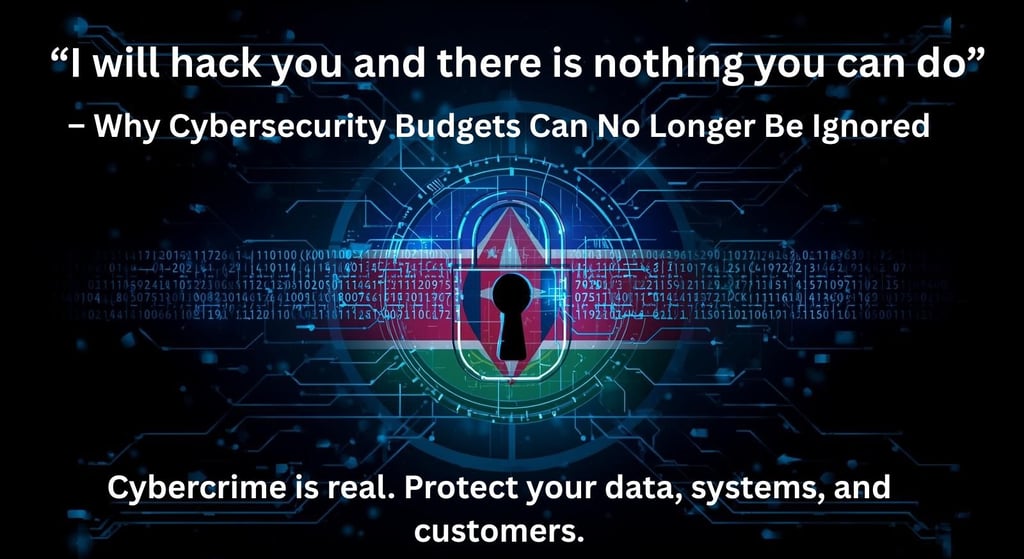I will hack you and there is nothing you can do
Kenya lost billions to hackers. Learn why businesses and individuals must budget for cybersecurity to protect data, systems, and customer trust.
Morris Mureti-Cybersecurity Analyst
9/26/20253 min read


“I will hack you and there is nothing you can do” – Why Cybersecurity Budgets Can No Longer Be Ignored
This chilling phrase is no longer an empty threat.
Cybercriminals today have advanced tools and the intent to cause financial, reputational, and operational damage.
In Kenya, incidents of cybercrime are increasing rapidly.
The Central Bank of Kenya (CBK) confirmed billions lost to hackers, while companies and individuals alike continue to report breaches.
Yet many organisations still fail to set aside a cybersecurity budget.
The misconception that “it will not happen to us” is proving costly.
From banks and airports to sports betting platforms and universities, cybercriminals are exploiting weaknesses wherever they exist.
This article highlights real cases, explains why budgeting for cybersecurity is vital, and offers practical steps to help organisations avoid devastating losses.
The Reality of Cybercrime in Kenya and Beyond
Cybercrime is no longer limited to sophisticated global syndicates.
Local hackers, sometimes even students, have successfully stolen millions by exploiting weak systems.
In Kenya, the cost of cybercrime is growing each year.
Banks, airlines, betting companies, and even government systems have all been compromised.
These cases illustrate the urgent need for preventative measures.
When organisations ignore cybersecurity, they are effectively handing criminals the keys to their systems.
The financial, legal, and reputational consequences are often far greater than the initial investment required for strong security.
Billions Lost: Central Bank of Kenya Report
The Central Bank of Kenya reported hackers stole KES 1.59 billion.
Experts believe this figure is under-reported, meaning the actual losses are likely higher.
The breaches not only highlight weak defences but also the scale of damage cybercriminals can inflict on national financial stability.
Such cases prove that no institution, however large, is immune to attack.
Software Compromises in Transport and Gaming
Kenya’s airport booking systems have been compromised, causing major disruptions.
SportPesa, a leading gaming company, also fell victim to hackers, leading to significant losses and downtime.
When critical software is infiltrated, operations halt, customers lose trust, and recovery costs soar.
These incidents show how businesses relying on digital platforms must prioritise cybersecurity.
University Student Hacks KES 11 Million
A dropout student at Meru University of Science and Technology successfully hacked systems and stole KES 11 million.
This case underlines how even individuals with limited resources can exploit vulnerabilities.
If a student can achieve this level of breach, the risk from organised criminals and international syndicates is far greater.
It proves no system is too small or insignificant to be targeted.
Why Every Organisation Needs a Cybersecurity Budget
Budgeting for cybersecurity is not optional—it is a necessity.
The cost of prevention is always lower than the cost of recovery.
Organisations must view cybersecurity as an essential investment, just like electricity or internet services.
Without it, every asset—data, money, and reputation—is at risk.
Protecting Data, Accounts, and Systems
Every company relies on data and systems to operate.
From financial records to communication platforms, breaches can paralyse an organisation.
Allocating funds ensures systems are patched, accounts are protected with strong authentication, and backups are in place.
Without these measures, recovery becomes nearly impossible once attackers strike.
Safeguarding Customer Privacy and Trust
Customers expect their data to be secure.
When breaches occur, trust erodes, and businesses may lose clients permanently.
A cybersecurity budget ensures encryption, monitoring, and privacy tools are in place.
By safeguarding customer information, organisations protect their most valuable asset—their reputation.
Practical Steps to Secure Your Organisation
Budgeting alone is not enough.
Organisations must act on their commitment by implementing practical measures.
Training staff, deploying secure systems, and constant monitoring are vital.
Cybercriminals adapt quickly, and only proactive measures can keep threats at bay.
Budget Allocation and Training
Cybersecurity budgets should cover more than software.
They must include staff training to recognise phishing, scams, and malicious links.
Employees are often the weakest link, but with awareness, they become the first line of defence.
Regular training reduces the risk of human error and strengthens organisational resilience.
Using Secure Software and Monitoring Systems
Investing in secure software, firewalls, and monitoring tools is critical.
Systems should be updated regularly, and anomalies tracked in real time.
24/7 monitoring detects attacks early, reducing potential losses.
By combining secure systems with continuous oversight, organisations significantly minimise risk.
Conclusion: The Cost of Ignoring Cybersecurity
Cybercrime is no longer a distant threat—it is a reality hitting businesses, governments, and individuals daily.
Kenya’s losses prove that ignoring cybersecurity is too costly.
Every shilling invested in security saves millions in potential damages.
The time to budget for cybersecurity is now, before criminals make good on their chilling threat:
“I will hack you and there is nothing you can do.”
EMPOWER
Transforming businesses through innovative digital solutions.
Innovate
Secure
Email Address:
info@retistech.com
Location:
5th Avenue Office Suites,
4th Floor, Suite 15,
Off Ngong Road
© Retis Systems 2026 | All Rights Reserved.
Quick Links
Contacts:
+254704293812
+254777293812
Services Categories


